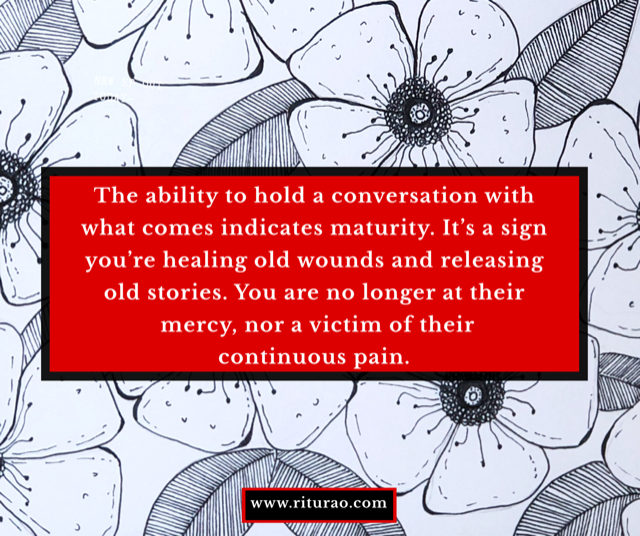
Most of us, most of the time, follow a pattern that looks something like this: Something happens, we react. If it’s good, we get happy, or take it for granted. If it isn’t good, we get anxious, fearful or angry, and demand things be different (i.e., control).
We forget we have very little control in the grand scheme of things, and much of our struggle comes from trying to do that exact thing.
The antidote to being at the whim of every circumstance, and thus reducing struggle, is self-awareness.
And one of the biggest benefits of practicing and increasing self-awareness is the ability to hold a conversation with what comes to us.
To hold a conversation with what comes—meaning, to observe and then choose how to act as is necessary or appropriate—is a mature response to what life hands us, even more so when it tests our courage and patience. It is the space Victor Frankl spoke about between stimulus and response.
Without space, we jump to reactivity. By creating space—even a small one— we can breathe, we can have a conversation, then choose how we want to proceed.
The conversation can go in many ways. It could mean dissecting or breaking down the problem or the fear or anxiety it triggers, or ideally, writing it down to see exactly what story or long-held belief about yourself it is bringing to life. It could mean, literally, having a conversation in your head between the scared and frantic inner child and the wise, mature, adult parent that is calm and reasoned.
The ability to hold this conversation and giving yourself the space, the time and the stillness to do so even in the midst of intense pressure and high stakes is an indicator of significant progress not only in your spiritual journey but your intellectual and mental maturity.
Maturity is a sign you’re healing old wounds and releasing old stories. You are no longer at their mercy nor a victim of their continuous pain; you have walked through the fire, found yourself capable of survival and are now grounded in true self-knowledge.
Refining the ability to hold conversations with what comes is one that takes practice but absolutely worth the effort.
I am in awe of the ability of being calm in the knowledge of catastrophe, or at least, all the events my mind interprets as such.
Instead of generating frantic energy or gathering worry to fuel you forward (a common favorite), to be able to stand still and actually see the catastrophe for what it truly is, what you can do to prevent its onslaught, how you can diminish its effects with preparedness and creativity, or salvage as best possible from the damage it leaves and good heavens, learn the lessons you need to learn so you can do better going forward.
It is from such conversation attempts (and halting, imperfect ones at that) that I noted interesting things about myself, the old stories I hold as a crutch, and how my aims in life have shifted. For example, it is sobering to realize the reason you say you want this but you actually don’t want it at all and that’s why it feels so heavy and why you’re struggling. Sobering, but ultimately liberating.
How powerful conversations can be, if we’re willing to really listen and be honest.
Another solid keeper, very relevant but still timeless.
Solids are my fav. Thanks Joel!